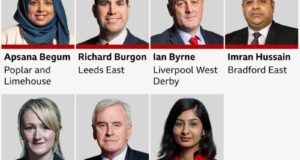
Theresa May has refused to promise unconditional support for her successor’s Brexit plan.
Asked if she would back whichever Brexit outcome the next prime minister achieves, including a no-deal Brexit, she said that amounted to agreeing to “whatever happens in future”.
Jeremy Hunt or Boris Johnson will be announced as the winner of the Tory Party leadership race on 23 July.
Both men have said they would try to renegotiate a deal with the EU.
Speaking to journalists on her official flight to the G20 summit in Osaka, Mrs May said: “It is important that we deliver a Brexit that is good for the British people.
“It will be up to my successor to take this forward. To find the majority in Parliament that I was not able to find and to deliver the decision of the British people in 2016.”
Mr Johnson has said the UK must leave on 31 October “deal or no deal”, but that the chances of a no-deal Brexit happening are a “million to one”.
However, in an interview with Conservative Home, Mr Johnson said every member of his cabinet would have to be “reconciled” with the policy of leaving on 31 October – with or without a deal.
Speaking to the BBC he said not leaving on 31 October would mean “a very, very serious further loss of confidence in politics”. “Let’s not turn this into some papier mache deadline,” he added.
Foreign Secretary Mr Hunt said if the UK got to October without the prospect of a deal, “we will leave without a deal”.
But he also called the Brexit date a “fake deadline” that could trigger a general election if Parliament rejects a no-deal Brexit.
A no-deal exit would see the UK leave the customs union and single market overnight and start trading with the EU on World Trade Organization rules.
The EU has repeatedly said it will not renegotiate the withdrawal agreement, despite this featuring in the plans of both candidates.
Theresa May arrived in Osaka something of a leader in limbo – an outgoing prime minister beset by incoming crises at home and abroad.
So far she’s been conspicuously trying to stay above the fray of the Tory leadership contest.
She’s told no-one who she voted for in narrowing the field down to two; she’s taken no sides.
On the RAF Voyager flight into Osaka, she gave journalists a hint that she has more to contribute before this saga ends, assuming, of course, it ever does.
The prime minister refused to pledge her support for whatever outcome may take shape under the next leader.
The leadership rivals have been unveiling pledges including on education and on immigration as their campaign continues.
Mr Johnson has promised to deliver an Australian-style points-based immigration system if he becomes prime minister, while Mr Hunt said he would cancel the tuition fee debts of young entrepreneurs who start businesses and employ people.
Both candidates are meeting the public in the Isle of Wight, ahead of hustings for party members in Bournemouth later.
On Monday, Defence Minister Tobias Ellwood said “a dozen or so” Conservative MPs could support a vote of no confidence to stop a no-deal Brexit.
But Mrs May said she believed it would be wrong for Conservatives to vote against the government on a confidence motion, saying that defeat on such a vote could lead to a general election.
The prime minister told reporters: “I believe there should be a Conservative government in the UK because a Conservative government would be better for the people of the UK.”
In an attempt to block a no-deal Brexit, Conservative Dominic Grieve and Labour’s Dame Margaret Beckett have tabled an amendment that would stop funding going to certain government departments if the UK leaves without a deal – unless it has been specifically approved by MPs.
If a vote in the Commons on Tuesday is successful, it would have the potential to cut off cash to four Whitehall departments – education, housing; communities and local government; international development; and work and pensions.
Under parliamentary procedure, MPs have to approve government spending, known as estimates, twice a year.
A spokesman for the prime minister said it would be “grossly irresponsible” to seek to stop a no-deal Brexit by blocking government spending.
 Weekly Bangla Mirror | Bangla Mirror, Bangladeshi news in UK, bangla mirror news
Weekly Bangla Mirror | Bangla Mirror, Bangladeshi news in UK, bangla mirror news







